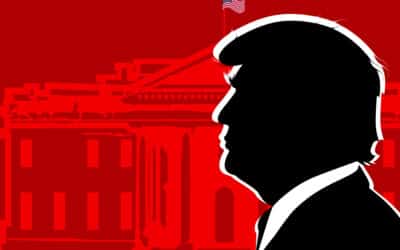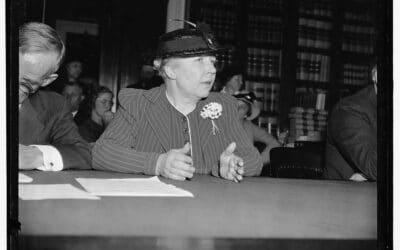For those who value liberty and peace, this has been a distressing — even disappointing — election season. Neither major candidate gives a hoot about individual rights, and neither shows any sign of understanding the spontaneous cooperation and coordination that society inevitably exhibits when people are free to pursue their interests peaceably.
Of course, disappointment implies positive expectations, and some of us had a few reasons to think this year might have been different. First, the major-party nominations were secured by two of the least respected people in American public life. Neither gets high marks for integrity — for good reason: both are chronic liars who make stuff up even when catching them at it is easy. I’ll here ignore the question who is the bigger liar because I have better things to do.
Second, both are big-government people. They see no problem that coercion — as opposed to freedom and its emergent social cooperation and coordination — cannot solve. They are remarkably alike in believing government can fix all things, so long as we have the will and, naturally, the right leaders. Even when they seem to lean toward freedom, its more illusion than fact. One calls for freedom of choice in only one area of life — reproduction — and so would compel others to pay the bill. The other vaguely criticizes business regulation, but offers a bizarre proposal: for every regulation passed, two must be repealed. How can that be serious? Shouldn’t regulations be judged on their own merits? If the two are worthy of repeal — as no doubt they are — why must that await the passage of a new one? If the one is worthy of passage — as no doubt it wouldn’t be — why must that await the repeal of the others? That’s a gimmick, not a commitment to freedom.
I think we can say that neither candidate regards freedom as important, and both must see it as an impediment to their aspirations. People can’t be allowed to obstruct the candidates’ efforts to make their — the ambiguous pronoun is used advisedly — lives better.
Third, for the first time maybe ever, the Republican pays not even lip service to free markets and limited government. True, past major candidates did not mean it, but still they felt they needed to talk that way. Ominously, the Republican has felt no such need. This could have been significant because it meant that a Libertarian Party candidate would have had that lane all to himself or herself. Most Americans aren’t interested in the fine points of political philosophy, so they have had trouble distinguishing libertarians and Republicans, mostly because of the apparent overlap in economic policy or at least in rhetoric. Libertarians are somewhat to blame for this, by the way. Yes, Americans see differences in foreign policy and civil liberties, but that hasn’t stopped them from thinking that libertarians are essentially conservative Republicans who like to get high and who are dubious about war.
So this was the year to draw the line in a way that no one could miss. You might think — and some libertarians do think — that on foreign policy the Republican has blurred the line, but let’s be serious.
This, then, potentially had the makings of a historic — even unique, once-in-a-lifetime — campaign.
Alas it didn’t work out that way. Why not?
Only part of the problem was Gary Johnson and Bill Weld. They miscalculated that they could make history by telling people they were nicer and more moderate than the two extremists in the major parties. Maybe a clearer libertarian message would not have resonated — but this was the year to give it a try. They did not do it.
But as I say, it was not their fault alone. The system is rigged — against any alternative to the Republican-Democratic oligopoly. This is too obvious to require elaboration. Early on, the cable news operations — realizing this was an unusual year and not wanting to get caught with their pants down — paid grudging attention to the Libertarian Party (less to the Green Party). But they seemed to be looking for the first opportunity to ignore it. When Johnson didn’t make the cut for the first “nonpartisan” Democratic and Republican Party-sponsored debate, the meager coverage shrank dramatically. When Johnson committed his alleged gaffes (don’t get me started on that nonsense), it was basically over. No third-party candidate has a chance in a national election if he or she is not covered seriously rather than as a mere curiosity. The media long ago decided that people aren’t interested in, or shouldn’t be distracted by, third parties, so that’s that.
In other words, I don’t think a hardcore Gary Johnson without Bill Weld would have done any better. This is not to forgive them for their shortcomings, but that’s the fact, Jack.
So where does that leave those of us who want liberty, social cooperation, and peace? With some exceptions, pretty much back at square one.
The builders of the post-World War II libertarian movement hoped at least to teach a significant part of the American public that economic intervention was 1) a violation of liberty and 2) self-defeating. In essence they sought to instill respect for the price system, so they targeted the minimum wage, rent control, price controls generally, and trade restrictions. Did the lesson take? The major candidates are anti-trade and speak kindly of a higher minimum wage. As I’ve said before, you could take a clipboard out to any mall and ask people to sign petition to put a minimum-wage increase on the ballot — and you will have enough signatures in short order. If price inflation were to rear its ugly head, I think we’d see broad support for price controls. Look at the reaction to price “gouging” whenever the weather gets severe and the backlash against Uber’s surge-pricing.
I’m not saying we’ve seen no progress — in important respects we have — but I am skeptical that such progress that has occurred is attributable to any new understanding of either liberty or the market process. If I’m right, the perceived benefits of liberty in one area are not intuitively expected in others. Maybe some people think, purely as an empirical matter, that a particular government intervention is ineffective; it’s always easy to say, “This case is different. Maybe it will work. We have to try.” I see no sign that people get that market forces — which emerge from our peaceful interaction — are real and unrepealable. When politicians say, “There’s nothing we [i.e., government] can’t do if we have the will,” most people believe them.
I’ve given credit to Ron Paul for spreading an understanding of the libertarian program — that it is regularly mentioned in cable-news conversation is nothing to sneeze at. But where is that understanding in the presidential election? Why do throngs of people cheer at the promise of free stuff? Why don’t they show an understanding that “incomes buy more under free trade.” It’s almost as though Ron Paul never made a splash. Few people seem disturbed by the major candidates’ lack of interest in liberty and bottom-up social cooperation. They are content with two trickle-down programs. Think about that.
In foreign policy, progress is also hard to find. Weariness with never-ending war is not the same as opposition to war. The “Vietnam syndrome” was overcome. I have no doubt the current war-weariness, if it still exists, will be too. For the war party, drones are a godsend.
What I’m saying is that the libertarian movement has not succeeded in selling its product — organizations that boast that they don’t compromise do no better than any others. We need a new business plan.































